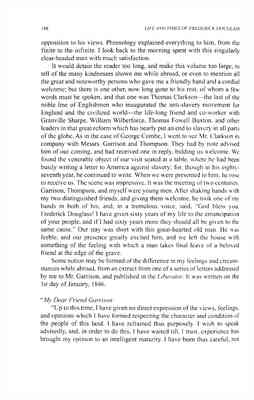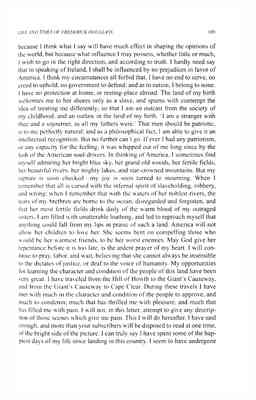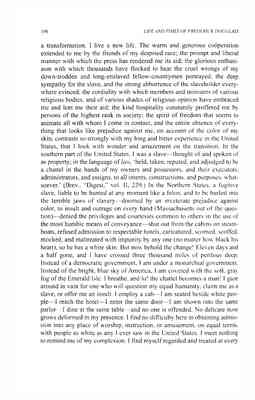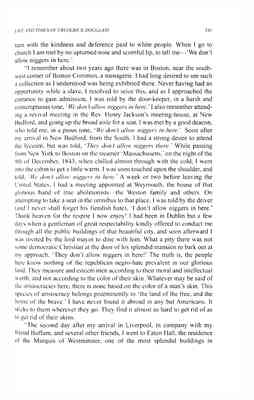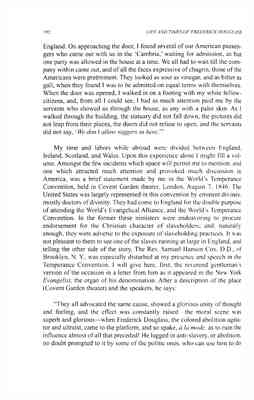Pages
36
188 LIFE AND TIMES OF FREDERICK DOUGLASS
opposition to his views. Phrenology explained everything to him, from the finite to the infinite. I look back to the morning spent with this singularly clear-headed man with much satisfaction.
It would detain the reader too long, and make this volume too large, to tell of the many kindnesses shown me while abroad, or even to mention all the great and noteworthy persons who gave me a friendly hand and a cordial welcome; but there is one other, now long gone to his rest, of whom a few words must be spoken, and that one was Thomas Clarkson—the last of the noble line of Englishmen who inaugurated the anti-slavery movement for England and the civilized world—the life-long friend and co-worker with Granville Sharpe, William Wilberforce, Thomas Fowell Buxton, and other leaders in that great reform which has nearly put an end to slavery in all parts of the globe. As in the case of George Combe, I went to see Mr. Clarkson in company with Messrs. Garrison and Thompson. They had by note advised him of our coming, and had received one in reply, bidding us welcome. We found the venerable object of our visit seated at a table, where he had been busily writing a letter to America against slavery; for, though in his eightyseventh year, he continued to write. When we were presented to him, he rose to receive us. The scene was impressive. It was the meeting of two centuries. Garrison, Thompson, and myself were young men. After shaking hands with my two distinguished friends, and giving them welcome, he took one of my hands in both of his, and, in a tremulous voice, said, "God bless you, Frederick Douglass! I have given sixty years of my life to the emancipation of your people, and if I had sixty years more they should all be given to the same cause." Our stay was short with this great-hearted old man. He was feeble, and our presence greatly excited him, and we left the house with something of the feeling with which a man takes final leave of a beloved friend at the edge of the grave.
Some notion may be formed of the difference in my feelings and circumstances while abroad, from an extract from one of a series of letters addressed by me to Mr. Garrison, and published in the Liberator. It was written on the 1st day of January, 1846.
"My Dear Friend Garrison:
"Up to this time, I have given no direct expression of the views, feelings, and opinions which I have formed respecting the character and condition of the people of this land. I have refrained thus purposely. I wish to speak advisedly, and, in order to do this, I have waited till, I trust, experience has brought my opinion to an intelligent maturity. I have been thus careful, not
37
LIFE AND TIMES OF FREDERICK DOUGLASS 189
because I think what I say will have much effect in shaping the opinions of the world, but because what influence I may possess, whether little or much, I wish to go in the right direction, and according to truth. I hardly need say that in speaking of Ireland, I shall be influenced by no prejudices in favor of America. I think my circumstances all forbid that, I have no end to serve, no creed to uphold, no government to defend; and as to nation, I belong to none. I have no protection at home, or resting-place abroad. The land of my birth welcomes me to her shores only as a slave, and spurns with contempt the idea of treating me differently; so that I am an outcast from the society of my childhood, and an outlaw in the land of my birth. 'I am a stranger with thee and a sojourner, as all my fathers were.' That men should be patriotic, is to me perfectly natural; and as a philosophical fact, I am able to give it an intellectual recognition. But no further can I go. If ever I had any patriotism, or any capacity ltn the feeling, it was whipped out of me long since by the lash of the American soul-drivers. In thinking of America, I sometimes find myself admiring her bright blue sky, her grand old woods, her fertile fields, her beautiful rivers, her mighty lakes, and star-crowned mountains. But my rapture is soon checked — my joy is soon turned to mourning. When I remember that all is cursed with the infernal spirit of slaveholding, robbery, and wrong; when I remember that with the waters of her noblest rivers, the tears of my brethren are borne to the ocean, disregarded and forgotten, and that her most fertile fields drink daily of the warm, blood of my outraged sisters. I am filled with unutterable loathing, and led to reproach myself that anything could fall from my lips in praise of such a land. America will not allow her children to love her. She seems bent on compelling those who would be her warmest friends, to be her worst enemies. May God give her repentance before it is too late, is the ardent prayer of my heart. I will continue to pray, labor, and wait, believing that she cannot always be insensible to the dictates of justice, or deaf to the voice of humanity. My opportunities for learning the character and condition of the people of this land have been very great. I have traveled from the Hill of Howth to the Giant's Causeway, and from the Giant's Causeway to Cape Clear. During these travels I have met with much in the character and condition of the people to approve, and much to condemn; much that has thrilled me with pleasure, and much that has filled me with pain. I will not, in this letter, attempt to give any description of those scenes which give me pain. This I will do hereafter. I have said enough, and more than your subscribers will be disposed to read at one time, of the bright side of the picture. I can truly say I have spent some of the happiest days of my life since landing in this country. I seem to have undergone
38
190 LIFE AND TIMES OF FREDERICK DOUGLASS
a transformation. I live a new life. The warm and generous coöperation extended to me by the friends of my despised race; the prompt and liberal manner with which the press has rendered me its aid; the glorious enthusiasm with which thousands have flocked to hear the cruel wrongs of my down-trodden and long-enslaved fellow-countrymen portrayed; the deep sympathy for the slave, and the strong abhorrence of the slaveholder everywhere evinced; the cordiality with which members and ministers of various religious bodies, and of various shades of religious opinion have embraced me and lent me their aid; the kind hospitality constantly proffered me by persons of the highest rank in society; the spirit of freedom that seems to animate all with whom I come in contact, and the entire absence of everything that looks like prejudice against me, on account of the color of my skin, contrasts so strongly with my long and bitter experience in the United States, that I look with wonder and amazement on the transition. In the southern part of the United States. I was a slave—thought of and spoken of as property; in the language of law, 'held, taken, reputed, and adjudged to be a chattel in the hands of my owners and possessors, and their executors, administrators, and assigns, to all intents, constructions, and purposes, whatsoever.' (Brev., "Digest," vol. II, 229.) In the Northern States, a fugitive slave, liable to be hunted at any moment like a felon, and to be hurled into the terrible jaws of slavery—doomed by an inveterate prejudice against color, to insult and outrage on every hand (Massachusetts out of the question)—denied the privileges and courtesies common to others in the use of the most humble means of conveyance—shut out from the cabins on steamboats, refused admission to respectable hotels, caricatured, scorned, scoffed, mocked, and maltreated with impunity by any one (no matter how black his heart), so he has a white skin. But now behold the change! Eleven days and a half gone, and I have crossed three thousand miles of perilous deep. Instead of a democratic government, I am under a monarchial government. Instead of the bright, blue sky of America, I am covered with the soft, gray fog of the Emerald Isle. I breathe, and lo! the chattel becomes a man! I gaze around in vain for one who will question my equal humanity, claim me as a slave, or offer me an insult. I employ a cab—I am seated beside white people—I reach the hotel—I enter the same door—I am shown into the same parlor—I dine at the same table—and no one is offended. No delicate nose grows deformed in my presence. I find no ditliculty here in obtaining admission into any place of worship, instruction, or amusement, on equal terms, with people as white as any I ever saw in the United States. I meet nothing to remind me of my complexion. I find myself regarded and treated at every
39
LIFE AND TIMES OF FREDERICK DOUGLASS 191
turn with the kindness and deference paid to white people. When I go to church I am met by no upturned nose and scornful lip, to tell me— 'We don't allow niggers in here.'
"I remember about two years ago there was in Boston, near the southwest corner of Boston Common, a menagerie. I had long desired to see such a collection as I understood was being exhibited there. Never having had an opportunity while a slave, I resolved to seize this, and as I approached the entrance to gain admission, I was told by the door-keeper, in a harsh and contemptuous tone, 'We don't allow niggers in here.' I also remember attending a revival meeting in the Rev. Henry Jackson's meeting-house, at New Bedford, and going up the broad aisle for a seat. I was met by a good deacon, who told me, in a pious tone, We don't allow niggers in here.' Soon after my arrival in New Bedford, from the South, I had a strong desire to attend the lyceum, but was told, 'They don't allow niggers there.' While passing from New York to Boston on the steamer 'Massachusetts,' on the night of the 9th of December, 1843, when chilled almost through with the cold, I went into the cabin to get a little warm. I was soon touched upon the shoulder, and told, 'We don't allow niggers in here.' A week or two before leaving the United States, I had a meeting appointed at Weymouth, the house of that glorious band of true abolitionists—the Weston family and others. On attempting to take a seat in the omnibus to that place. I was told by the driver (and I never shall forget his fiendish hate). 'I don't allow niggers in here.' Thank heaven for the respite I now enjoy! I had been in Dublin but a few days when a gentleman of great respectability kindly offered to conduct me through all the public buildings of that beautiful city, and soon afterward I was invited by the lord mayor to dine with him. What a pity there was not some democratic Christian at the door of his splendid mansion to bark out at my approach, 'They don't allow niggers in here!' The truth is, the people here know nothing of the republican negro-hate prevalent in our glorious land. They measure and esteem men according to their moral and intellectual worth, and not according to the color of their skin. Whatever may be said of the aristocracies here, there is none based on the color of a man's skin. This species of aristocracy belongs preeminently to 'the land of the free, and the home of the brave.' I have never found it abroad in any but Americans. It sticks to them wherever they go. They find it almost as hard to get rid of as to get rid of their skins.
"The second day after my arrival in Liverpool, in company with my friend Buffum, and several other friends, I went to Eaton Hall, the residence of the Marquis of Westminster, one of the most splendid buildings in
40
192 LIFE AND TIMES OF FREDERICK DOUGLASS
England. On approaching the door, I found several of our American passengers who came out with us in the 'Cambria,' waiting for admission, as but one party was allowed in the house at a time. We all had to wait till the company within came out, and of all the faces expressive of chagrin, those of the Americans were preeminent. They looked as sour as vinegar, and as bitter as gall, when they found I was to be admitted on equal terms with themselves. When the door was opened, I walked in on a footing with my white fellowcitizens, and, from all I could see, I had as much attention paid me by the servants who showed us through the house, as any with a paler skin. As I walked through the building, the statuary did not fall down, the pictures did not leap from their places, the doors did not refuse to open, and the servants did not say, 'We don't allow niggers in here.'"
My time and labors while abroad were divided between England, Ireland, Scotland, and Wales. Upon this experience alone I might fill a volume. Amongst the few incidents which space will permit me to mention, and one which attracted much attention and provoked much discussion in America, was a brief statement made by me in the World's Temperance Convention, held in Covent Garden theater, London, August 7, 1846. The United States was largely represented in this convention by eminent divines, mostly doctors of divinity. They had come to England for the double purpose of attending the World's Evangelical Alliance, and the World's Temperance Convention. In the former these ministers were endeavoring to procure endorsement for the Christian character of slaveholders; and, naturally enough, they were adverse to the exposure of slaveholding practices. It was not pleasant to them to see one of the slaves running at large in England, and telling the other side of the story. The Rev. Samuel Hanson Cox, D. D., of Brooklyn, N. Y., was especially disturbed at my presence and speech in the Temperance Convention. I will give here, first, the reverend gentleman's version of the occasion in a letter from him as it appeared in the New York Evangelist, the organ of his denomination. After a description of the place (Covent Garden theater) and the speakers, he says:
"They all advocated the same cause, showed a glorious unity of thought and feeling, and the effect was constantly raised—the moral scene was superb and glorious—when Frederick Douglass, the colored abolition agitator and ultraist, came to the platform, and so spake, à la mode, as to ruin the influence almost of all that preceded! He lugged in anti-slavery, or abolition, no doubt prompted to it by some of the politic ones, who can use him to do
